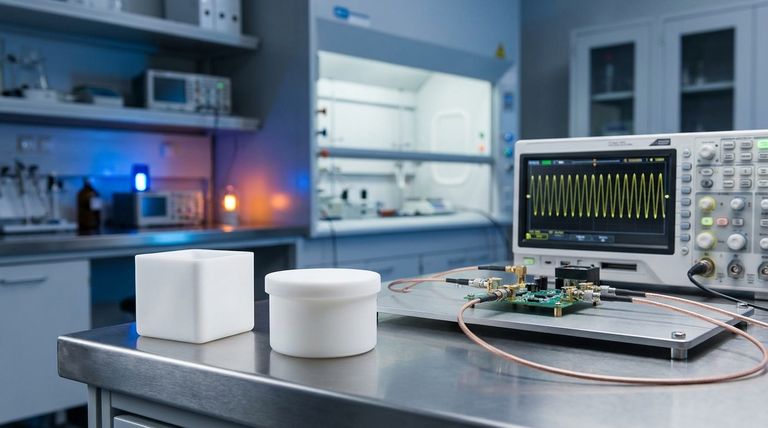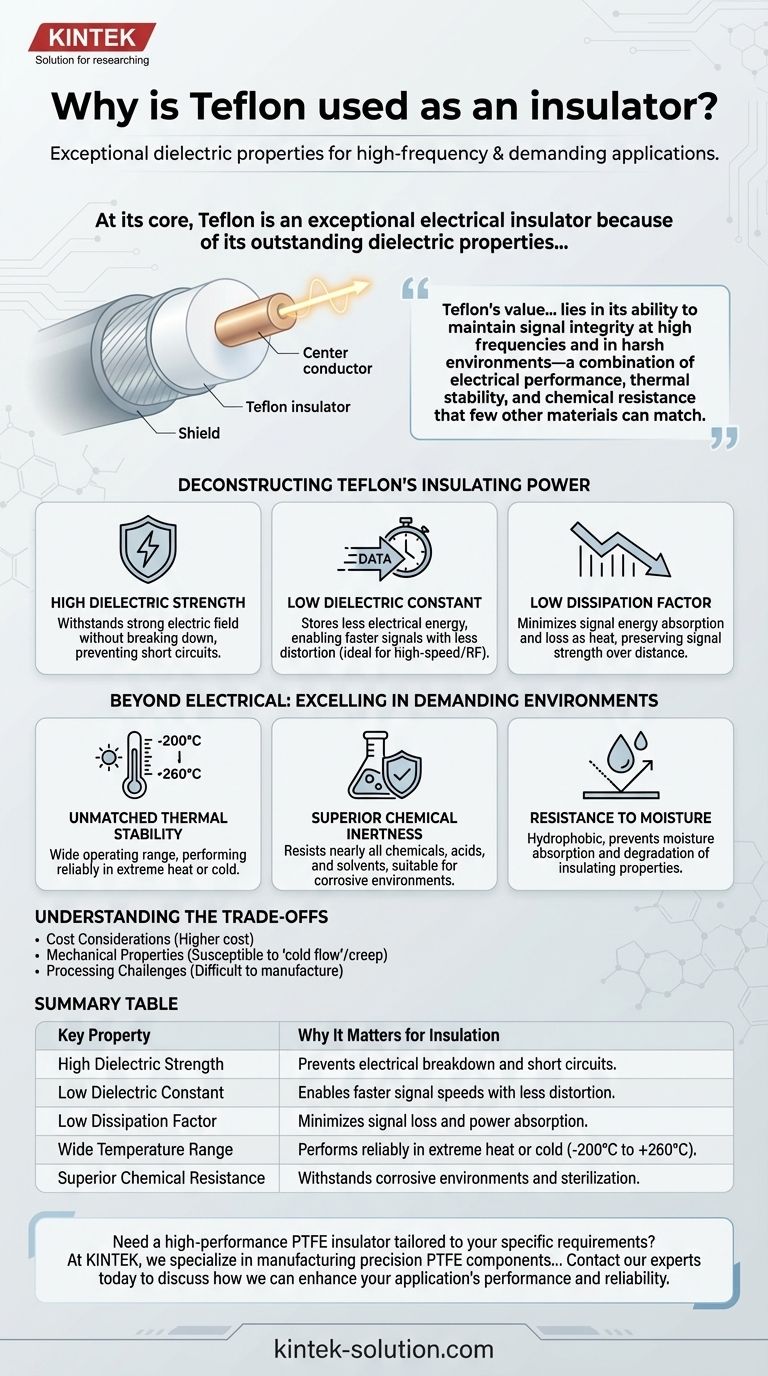At its core, Teflon is an exceptional electrical insulator because of its outstanding dielectric properties, making it a superior choice for high-frequency applications. Its unique molecular structure of tightly bonded carbon and fluorine atoms strongly resists the flow of electrons while minimizing the absorption of signal energy, which is critical for preserving the integrity of data and radio signals.
Teflon's value as an insulator isn't just that it blocks electricity. Its true strength lies in its ability to maintain signal integrity at high frequencies and in harsh environments—a combination of electrical performance, thermal stability, and chemical resistance that few other materials can match.

Deconstructing Teflon's Insulating Power
To understand why Teflon (specifically PTFE, or Polytetrafluoroethylene) is so valued, we must look beyond the simple concept of blocking current and examine the properties that affect signal performance.
The Foundation: High Dielectric Strength
Dielectric strength measures a material's ability to withstand a strong electric field before it breaks down and conducts electricity.
Teflon possesses a very high dielectric strength. This fundamental property ensures it can reliably prevent short circuits, even under high voltage stress, making it a robust and safe insulator.
The Key to Speed: Low Dielectric Constant
The dielectric constant (Dk) indicates how much electrical energy is stored in a material when it's exposed to an electric field. For insulation, lower is better.
Teflon has an extremely low dielectric constant that remains stable across a wide range of frequencies. This means less signal energy is stored in the insulator, reducing capacitance and allowing signals to travel faster and with less distortion. This is paramount in high-speed data cables and RF connectors.
Preserving the Signal: Low Dissipation Factor
The dissipation factor (also called loss tangent) measures how much signal energy is absorbed by the insulator and lost as heat.
Teflon's dissipation factor is exceptionally low. This ensures that the maximum amount of signal power reaches its destination, which is vital for long cable runs or sensitive communication systems where every decibel of signal strength counts.
Beyond Electrical: Excelling in Demanding Environments
Teflon's utility is cemented by a suite of physical properties that allow it to perform where other insulators would fail.
Unmatched Thermal Stability
Teflon has a very high melting point and a wide operating temperature range (typically -200°C to +260°C).
This allows it to be used in high-power applications that generate significant heat or in environments with extreme temperatures without degrading its insulating capability.
Superior Chemical Inertness
Teflon is famously inert, resisting nearly all chemicals, acids, and solvents.
This ensures the insulator's physical and electrical integrity is not compromised in corrosive industrial settings, aerospace applications, or medical devices that undergo sterilization.
Resistance to Moisture
Teflon is hydrophobic, meaning it repels water.
Moisture absorption can severely degrade the insulating properties of many materials. Teflon's inability to absorb water ensures its performance remains stable and predictable, even in high-humidity conditions.
Understanding the Trade-offs
No material is perfect. Acknowledging Teflon's limitations is key to making an informed decision.
Cost Considerations
Teflon is significantly more expensive than common insulators like Polyvinyl Chloride (PVC) or Polyethylene (PE). Its use is therefore justified primarily in applications where its unique performance characteristics are a strict requirement.
Mechanical Properties
While durable, Teflon is a relatively soft material and can be susceptible to "cold flow," or creep, where it slowly deforms under sustained mechanical pressure. This must be a consideration in designs where tight, long-term seals or fits are critical.
Processing Challenges
Teflon's high melting point and viscosity make it more difficult to process and manufacture into complex shapes compared to more common thermoplastics, which can contribute to the final cost of the component.
Making the Right Choice for Your Application
Selecting the right insulator requires matching the material's properties to the primary goal of your project.
- If your primary focus is high-frequency signal integrity (e.g., RF cables, high-speed data): Teflon is often the superior choice due to its low dielectric constant and minimal signal loss.
- If your primary focus is performance in harsh chemical or high-temperature environments: Teflon's thermal stability and chemical inertness make it an exceptionally reliable insulator.
- If your primary focus is cost-effectiveness for standard, low-frequency wiring: Materials like PVC or polyethylene are typically more practical and economical insulators.
Understanding these distinctions allows you to select an insulator not just for its ability to block current, but for its capacity to preserve performance where it matters most.
Summary Table:
| Key Property | Why It Matters for Insulation |
|---|---|
| High Dielectric Strength | Prevents electrical breakdown and short circuits, even under high voltage. |
| Low Dielectric Constant | Enables faster signal speeds with less distortion, ideal for high-frequency applications. |
| Low Dissipation Factor | Minimizes signal loss and power absorption, preserving signal strength over distance. |
| Wide Temperature Range | Performs reliably in extreme heat or cold (-200°C to +260°C). |
| Superior Chemical Resistance | Withstands corrosive environments and sterilization processes without degrading. |
Need a high-performance PTFE insulator tailored to your specific requirements?
At KINTEK, we specialize in manufacturing precision PTFE components—including seals, liners, and custom labware—for the semiconductor, medical, laboratory, and industrial sectors. Whether you need a prototype or a high-volume order, our expertise ensures your components deliver the exceptional electrical insulation, thermal stability, and chemical resistance that Teflon is known for.
Contact our experts today to discuss how we can enhance your application's performance and reliability.
Visual Guide

Related Products
- Custom PTFE Parts Manufacturer for Teflon Containers and Components
- Custom PTFE Parts Manufacturer for Teflon Parts and PTFE Tweezers
- Custom PTFE Measuring Cylinders for Advanced Scientific and Industrial Applications
- Custom PTFE Sleeves and Hollow Rods for Advanced Applications
- Custom PTFE Teflon Balls for Advanced Industrial Applications
People Also Ask
- What are the future trends for PTFE O-ring seal technology? Advanced Composites, 3D Printing & Sustainability
- How do PTFE and NBR oil seals compare in terms of cost? Balancing Initial Price vs. Long-Term Value
- What is the water transmission rate of Teflon encapsulated O-rings? A Guide to Superior Moisture Sealing
- What are the key advantages of PTFE-jacketed spring energized seals? Unlock Unmatched Sealing Performance
- What is the temperature range that PTFE gaskets can withstand? A Guide from -200°C to +260°C
- What are the limitations of PTFE sheet lining in chemical tanks? Understand the Critical Trade-Offs
- What regulatory standards do Medical Grade PTFE Liners meet? Ensuring FDA & ISO Compliance for Patient Safety
- What are the advantages of solid Teflon O-rings? Achieve Unmatched Chemical & Thermal Resistance



















